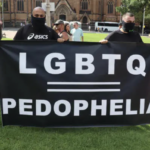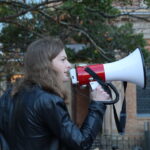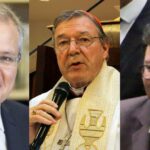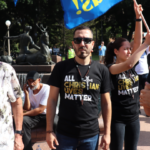Minns, Time to De-Christianise Parliament in Multifaith/Nonreligous NSW, Say Rationalists and Greens
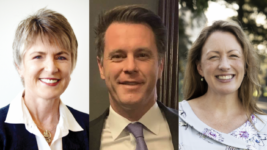
The March state election saw Catholic premier Dominic Perrottet hand over the reins of NSW top minister to current Catholic premier Chris Minns, who is now set to establish a multifaith religious advisory group to parliament with a direct line to the multicultural affairs minister.
Labor’s NSW Faith Affairs Council will replace the Coalition’s January-established NSW Religious Communities Advisory Council, which was to provide religious perspectives on policy. Yet, it’s line wasn’t so direct, as it reported to the Multicultural NSW Advisory Board.
And a key feature of both councils trumpeted by the major parties were their multifaith makeup.
However, the Rationalist Society of Australia (RSA) wrote to Minns and multicultural minister Steve Kamper on commencement of the 58th NSW parliament last week, suggesting that, in line with the state’s social makeup, reciting the Lord’s Prayer to begin each sitting day be abolished.
While on the second sitting day of the new parliament, NSW Greens MLC Abigail Boyd moved a motion calling on the Procedure Committee to inquire into alternatives to reciting the Lord’s Prayer, which could involve a minute’s silence, a statement of duty or simply abolishing the practice.
A rational decision
The practice of reciting Christian prayer prior to a NSW parliamentary sitting was established as a standing order in 1934, which was a time when the overwhelming majority of the NSW European-descendant community would have been Christian.
But, as the RSA has been tracking, the composition of the NSW constituency and, indeed, the entire nation has become increasingly nonreligious or associated with non-Christian faiths, with the 2021 Census figures showing that 33.2 percent of those in NSW marked “no religion” as their preference.
The rationalists have further been raising ethical questions about Minns’ religious voice to the multicultural minister. And it’s clear that if the new premier is to champion multifaith representation in policymaking, he can hardly argue for the retention of the Christian trappings of parliament.
Folly not solemnity
Boyd has had her sights on removing Christian prayer from NSW parliament for a number of years now. And she’s not the only Australian parliamentarian trying to progress the same reform when looking towards other jurisdictions.
Indeed, the Andrews government has promised to consider alternatives in Victorian parliament.
“As a person who is not of Christian faith, I have two choices on every morning of sitting day,” said Boyd on attempting to see the prayer dropped in 2020, “either stand outside” or stand inside “falsely participating in a ritual that is not mine… betraying my own beliefs and devaluing those of others”.
Boyd does expect resistance though, especially amongst the disproportionate number of members who are of the Christian faith.
But again, regardless of personal affiliations, the Minns government is striving for multifaith representation, which is made hollow with the retention of the prayer practice.
Sydney Criminal Lawyers spoke to RSA president Dr Meredith Doig and NSW Greens MLC Abigail Boyd about the need to abolish Christian prayer from parliament, the government’s prioritisation of a multifaith religious voice and the overrepresentation of Christianity on Macquarie Street.
The new NSW parliament convened for the first time on 9 May. To coincide with this, RSA wrote to new premier Chris Minns calling for an end to Christian worship in this state’s seat of government and, in particular, the reciting of the Lord’s Prayer before a sitting day.
Dr Doig, reciting the Lord’s Prayer prior to a day in parliament is a long tradition in NSW, why not simply let it carry on? Why is such reform necessary?
Doig: As the central institution of democracy, the state parliament should be a welcoming place for all people.
Yet, by requiring all people in attendance – elected representatives, staff and those in the public gallery – to observe daily Christian worship, the Legislative Assembly and Legislative Council send a message to those with different worldviews that they’re not recognised or respected.
NSW is rich in diversity, made up of people of many faith backgrounds and, increasingly, people of no religion.
The 2021 ABS Census showed that the number of people identifying as not religious is rising rapidly, climbing from 25.5 percent in 2016 to 33.2 percent.
The Census also showed the state has significant non-Christian religious populations.
Tradition is never a good reason to keep doing something. It used to be traditional that only men were elected to state parliament. It was not traditional to say an Acknowledgement of Country in parliament.
Australians have agreed to change those traditions because they’re no longer appropriate in modern society.
Reciting prayers was a tradition in local governments, but councils in NSW and around the country are increasingly removing mandatory prayer rituals.
In NSW, in just the past couple of years, the councils of Shoalhaven, Wagga Wagga and Lismore, among others, have introduced secular, more inclusive practices that better reflect the communities they serve.
Numerous other councils across the country – including Adelaide in South Australia, Glenorchy and Clarence in Tasmania, Mornington Peninsula Shire and Gippsland South in Victoria – have also removed mandatory Christian worship at the beginning of their meetings.
It’s not only local councils who are stepping up to these reforms. The Victorian Labor government has promised to replace prayer rituals in state parliament during its new term of office.
In 2018, a committee of the Australian Senate decided against replacing prayer rituals because, the committee observed, there was no “momentum for change”.
But now there is clearly a lot of momentum for change building across NSW and the whole country on this issue. We expect the Senate will reconsider this issue one day soon.
Public support is overwhelmingly in favour of reform. A viewer poll on the ABC Q&A program in April this year found 85 percent of more than 2,500 respondents voted against the parliament starting each day with Christian worship, with only 12 percent in favour.
Labor Party politicians, both in NSW and at the federal level, talk a lot about the importance of multiculturalism and diversity.
It would be hypocritical of Labor to continue requiring elected representatives, and everyone else in attendance at the state and federal parliaments, to observe the worship rituals of one particular religion.
In the lead-up to the March election, Labor leader Minns promised to create the NSW Faith Affairs Council, which will have a direct line to the minister and will represent a multitude of different religions reflecting the multifaith composition of our society.
The formation of the council was an election promise, with its multifaith nature prominently featuring as a highlight.
In your opinion, does the promotion of the NSW Faith Affairs Council’s multifaith composition create a necessity to remove the features of parliament that apply only to Christianity? And do you see a clash here if Labor tries to maintain both positions?
Doig: There is an odd juxtaposition here.
The Minns government is wanting to establish a Faith Advisory Council to give different kinds of religious groups a voice on policy matters while, at the same time, the chambers of state parliament continue to require everyone – including Hindus, Muslims and Buddhists, atheists and secular humanists – to observe Christian-only worship at the opening of each parliamentary day.
Surely, the Faith Advisory Council should support reform that makes the practices of parliament more inclusive and reflective of the state’s diversity.
However, we are concerned that, in practice, the Faith Advisory Council will only serve to strengthen religious organisations’ privileges. They already have extraordinary levels of access to politicians and policymakers.
These issues are separate, of course, but I do think they show how religious voices continue to be privileged in policymaking and in government institutions in Australia today.
With our nation’s demographics rapidly changing and our population becoming increasingly diverse and nonreligious, sooner or later governments and institutions will have to start paying attention to the voices of nonreligious and pro-secular groups like ours.
At a meeting of faith leaders in late February, Mr Minns said NSW was “proudly multicultural and proudly multifaith”, and argued that his party supported “egalitarianism in creating a society in which everyone has equal access to opportunity.”
On these two issues, the premier now has an opportunity to put words into action – to recognise the contribution of nonreligious people to the NSW community and to make sure they have an equal opportunity to be consulted and have input into policymaking.
In the lead-up to the election, whilst he was still in opposition, you wrote to Minns asking questions as to how the NSW Faith Affairs Council will be operating.
It’s known that this body will have a direct line to consult NSW multicultural minister Steve Kamper, whose portfolio is being expanded to incorporate religious matters.
Since it now seems likely the group is about to come into play, what sort of outstanding questions or concerns do you have?
Doig: There are a number of questions the government needs to answer about this new body: its makeup, functions and scope, and how transparent its deliberations and advice to the government will be.
In April, after the election, we wrote to premier Minns and minister Kamper seeking clarification on these points.
We believe that a formal consultative mechanism such as the Faith Affairs Council should offer equal access to representatives of all worldviews, whether they be religious, nonreligious or ex-religious people.
So, we asked premier Minns and minister Kamper whether they would be ensuring that the Faith Affairs Council would be genuinely open to groups representing all worldviews.
We asked whether they would invite representatives of atheist and secular humanist groups, and in particular, whether ex-religionists would be represented on the body.
We have also asked the Minns government how it will ensure that a wide range of views is represented from within faith communities, as we know that many vocal religious clerics espouse views that are completely at odds with the majority of their own flocks.
In the Religiosity in Australia research series, social researcher Neil Francis has shown that significant majorities of mainstream religious people support social reforms that are opposed by the faith leaders who claim to represent them.
For example, the vast majority of Catholics in Australia support same-sex marriage, safe and legal access to abortion and voluntary assisted dying.
So, we think most citizens in NSW, including most religious people, would be deeply concerned if the Minns government gave a handful of religious clerics greater levels of influence over government policymaking.
It would be particularly concerning if a few very vocal faith leaders with dogmatic views dominated the body – and the early signs are not good.
Last year, Mr Kamper told a Catholic media outlet that Labor’s Faith Affairs Council would be able to advise on issues such as “objections to euthanasia/voluntary assisted dying” and “additional funding for chaplaincy”.
But we know the overwhelming majority of NSW citizens – including Catholics – support the state’s new voluntary assisted dying laws.
And, as for more funding for chaplains, I would think most people would prefer the government to spend more money on appropriately qualified wellbeing and pastoral care officers in schools, hospitals, and prisons, rather than religious chaplains with theological degrees.
And to you Abigail, last Thursday, you moved a motion calling on the Procedure Committee to “inquire into and report on the appropriateness of and alternatives to the recitation” of the Lord’s Prayer at the commencement of each day of parliament.
Indeed, you’ve raised this issue on a number of occasions over recent years. So, why is opening NSW parliament with the Lord’s Prayer problematic? And in your mind, what sort of outcomes does this tradition lead to in today’s society?
Boyd: Our institutions should reflect the diversity of gender, ethnicity, religion and cultural backgrounds of the people they represent, but the reality is they rarely do.
The reading of the Lord’s Prayer in parliament is just another way this place fails to actually look like the people it’s meant to represent.
Parliament isn’t a Christian institution, but with an exclusively Christian prayer read every day in parliament, you wouldn’t know it.
Fundamentally and constitutionally, our democracy is wholly separate from the church – from any church – and yet, a core part of parliament’s daily proceedings is exclusionary: an anachronism in what is a contemporary and slowly diversifying parliament.
Acknowledging that parliament is not a Christian institution would help in breaking down the sociocultural barriers to participation in our democratic institutions and bring the parliament more into step with modern society.
It would make it more representative of the diversity within general society and, increasingly, more representative of those of us working within parliament as well.
The former Perrottet government established a religious advisory body late in its term in office.
The current Minns government went to the ballot with a promise to establish the NSW Faith Affairs Council, which will be a body of multifaith leaders that can directly advise multicultural minister Steve Kamper on matters that affect people of faith.
Indeed, Kamper’s portfolio is to be expanded to include religious affairs.
What are your thoughts on the establishment of a religious advisory body with a direct line to the minister? And are there concerns around incorporating religious matters into the multicultural portfolio?
Boyd: Parliament is a secular institution. A golden line directly from religious institutions to the minister contradicts this.
A majority of people in NSW do not identify with any religion and it’s important that politics and parliament moves towards inclusivity and not away from it.
While religion can play an important cultural role for many communities, ensuring we make space to accommodate different cultures and religions and prioritise cultural and religious sensitivity is not the same thing as providing the leaders of organised religion with direct political influence.
And lastly, both the outgoing and incoming NSW premiers are Catholic. And both of them prioritised having more input from religious bodies in the state’s political sphere.
So, what are your thoughts on giving religious beliefs the leg-up in NSW politics? And as most parliamentarians of faith are Christians, how do you consider progressing reforms, such as the one you’re now proposing, is going to be received and responded to?
Boyd: The separation of church and state means that we shouldn’t be allowing any religious organisation to influence our deliberations in parliament.
I really noticed this during the abortion debate, where we gave disproportionate weight to the views of religious institutions.
The laws which govern our society should be determined through reason, debate and our common humanity, not the dogma of particular religious sects.
There is a disproportionate number of religious MPs compared with the rest of the population. That’s just the fact of where we’re at.
It shows that the church is not just interfering at a parliamentary level but has for a long time been prioritising engagement with political parties to ensure their influence in the halls of power.
I know this won’t be received well by those MPs, but I don’t do what I do in parliament to please them.
I do, however, believe that the common sense of my motion will be well received by the majority of the population who are increasingly secular and want that represented in their democracy.


